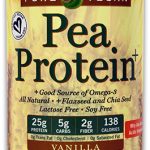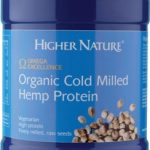Like it or not, we can’t get away from it; Western culture has a love affair with eating protein – especially in the UK. And this has ensured that vegans and vegetarians seem to receive little respite from all the questions they get about their choice to go meat-free – in spite of the fact that it’s relatively easy to cater a non-meat diet so one might receive enough of the muscle-building and low blood sugar-combating nutrient that’s protein.
And, when you look into it, all of the non-meat protein options that are possible really shouldn’t come as any surprise. After all, so-called incomplete proteins (such as nuts and whole grains) are capable of blending together to generate ‘complete protein’, which is then brimming with all nine of the essential amino acids that the body very much needs but isn’t capable of producing on its own.
Here follows then a list of some of the best vegan/ vegetarian foods available for providing the human body with health-giving protein:
Chia seeds
(2.5 grams of protein per tablespoon)
Serving suggestion: add them to a vegan smoothie
On their own, chia seeds don’t contain an abundance of protein (but some, certainly), yet they do feature the essential amino acids we need – yes, all nine of them. Moreover, as they’re capable of stabilising blood sugar thanks to their combined protein, fat and fibre content, they’re an all-round nutritious food, to say the least. Plus, the specific Omega-3 fatty acids they also comprise (alpha-linolenic acid) can help contribute to lowering the risk of heart disease.
Soybeans (and soy products)
(2-21 grams of protein per half-cup)
Serving suggestion: dry roasted soybeans as snacks or in nut and dried fruit mixes, tempeh can be steamed or pan-fried are feature instead of meat in a sandwich, while edamame (immature soybeans in a pod) works as an appetiser and soymilk is ideal with oatmeal.
Owing to how much bang for your buck soybeans deliver in the protein department, they undoubtedly make for great snacks – indeed, a half-cup’s worth of delicious dry roasted soybeans is packed with as much of 18 grams of protein. In terms of other soy-derived products, you might opt for steamed soybeans (4 grams protein per half-cup), tofu (10 grams protein per half-cup) or soy milk (2 grams protein per half-cup), not least as they also offer magnesium, a mineral which is great for aiding muscle development, energy generation and carb metabolism.
Hemp seed
(3.3 grams of protein per tablespoon)
Serving suggestion: hemp seeds can be added to both cereals and salads (just sprinkle them on top) or in mixed into shake-drinks, ideally after workouts.
Don’t be put off by the marijuana connotation, hemp seeds aren’t intoxicating in the slightest, yet they’re hugely nutritious. Brimming with fibre and Omega-3 fatty acids, they’re capable therefore of contributing to the battle some have to face against heart disease, metabolic syndrome and obesity.
Quinoa
(4 grams of protein per half-cup)
Serving suggestion: you might try pairing quinoa with vegetable beans as a constituent part of a meal, while it can also be used as an excellent ingredient in the making of a veggie burger.
There are few trendier foods around today than this ancient grain (approximately 1,400 different quinoa products are in existence; yes, really!). So, what’s the appeal? Well, it possesses more protein than many similar grain-based food and is rich in fibre, heart-healthy unsaturated fats and the L-arginine amino acid; the latter being likely to promote muscle growth as opposed to that of fat in the body.
Spinach
(5 grams of protein per cup)
Serving suggestion: there’s actually many things you can do with a serving of spinach, but there’s probably nothing better than adding it old favourites like omelettes, salads and stir-fries.
Peas
(8 grams of protein per cup)
Serving suggestion: add them as a vegetable side as you would to a meat-as-protein meal (without meat, peas are great protein providers for any meal)
Popeye may not like it, but common, too-often-considered-bland peas contain more protein than spinach, relatively speaking. Should you enjoy a ‘cup’ portion of them a day, they’ll also account for 100 percent of your daily intake of Vitamin C, aiding the healthy maintenance of your immune system, among other things.
Lentils
(18 grams of protein per cup)
Serving suggestion: give them a go in a soup
Lentils are a terrific option for vegans and vegetarians when it comes to their protein needs. One ‘cup’ serving offers as much protein as three eggs, while their high fibre content ensures they sate hunger very effectively and can reduce fat gain too. Moreover, studies suggest that those whose diets comprise at least four servings a week of legumes enjoy lower cholesterol levels and weight reduction.
Shelled pumpkin seeds
(9 grams of protein per ounce)
Serving suggestion: add them to salads or rice dishes or eat them raw
Great for the minerals that are the energy-boosting magnesium, phosphorus and zinc, pumpkin seeds are also packed full of protein – how’s that for a mainstay of Hallowe’en more used to scaring the kids!
Almonds
(6 grams of protein per ounce)
Serving suggestion: as they can help you burn fat and carbs during workouts, have a daily serving of almonds before you pop to the gym
Terrific for weight-loss – as much as anything else, that is – the tasty nuts that are almonds have been found in studies to be more effective than a mixture of complex carbohydrates and safflower oil in reducing one’s weight, as part of a calorie-restricted diet. Indeed, this research discovered that in less than six months, the consumption of almonds had contributed to weight loss and reduction in body mass index (BMI) of 62 percent among test subjects.
Cashews
(5 grams of protein per ounce)
Don’t just stick to almonds when it comes to your nut-derived protein, though; not only are we talking about the superior protein contributions cashews can make here, but also the fine source of magnesium and biotin they offer. The former mineral’s great for relieving constipation, augmenting cognitive function and improving the immune system, while the latter contributes to the good health of hair and nails.
Natural protein supplements
Alternatively, of course, you may find there’s a number of the above foods that simply aren’t for you; you simply can’t eat them – perhaps because of a nut allergy, for instance. In that scenario you can boost your nutritional intake (in addition to non-meat protein foods) through high-quality, naturally derived supplementation. The following examples are both available through us at The Finchley Clinic:
 Pure Vegan Pea Protein – a blend of protein derived from golden pea kernels; it’s vegan-certified, lactose, gluten and cholesterol free, features no artificial flavours and no dairy or sweeteners.
Pure Vegan Pea Protein – a blend of protein derived from golden pea kernels; it’s vegan-certified, lactose, gluten and cholesterol free, features no artificial flavours and no dairy or sweeteners.
 Organic Cold Milled Hemp Protein – a tasty, raw, 100 percent-certified organ protein food that contains even more of the nutrient than meat, fish, eggs, dairy and soya; easy to digest and cholesterol-free.
Organic Cold Milled Hemp Protein – a tasty, raw, 100 percent-certified organ protein food that contains even more of the nutrient than meat, fish, eggs, dairy and soya; easy to digest and cholesterol-free.
